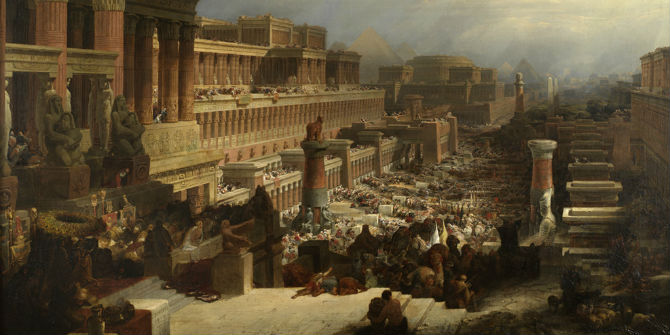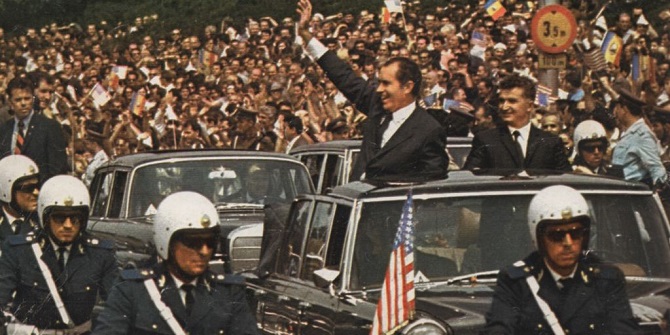 Can re-reading ancient myths help us to understand Brexit and our own reactions to it? Kalypso Nicolaïdis (University of Oxford) introduces her new book Exodus, Reckoning, Sacrifice: Three Meanings of Brexit.
Can re-reading ancient myths help us to understand Brexit and our own reactions to it? Kalypso Nicolaïdis (University of Oxford) introduces her new book Exodus, Reckoning, Sacrifice: Three Meanings of Brexit.
In the beginning was the word, and the word was Brexit. But nobody quite knew what that word meant.
And then the oracle spoke: ‘Brexit means Brexit’.
What did it say about Britain’s exit from the EU that the word itself – the most googled word in the UK in 2016 – became the preferred contender for its elucidation? No matter that many different messages were received, in Britain or on the continent: ‘we will not backtrack’, ‘no halfway house’, ‘we are ready to pay the price’, versus ‘it’s your choice’, ‘it’s all over’, ‘good riddance’, ‘you will suffer the consequences’.

Since the June 2016 referendum, pundits and ordinary citizens have found countless ways of dealing with the ubiquitous tautology. Glee, despair or remorse on the departing British ship. Hurt, sadness or spite on the abandoned European shores. Elation or anger. Miracle! Debacle! Studied indifference.
But what happened next, after plodding through our emotions? We rationalised, gave reason a go. We turned to the past, trying to explain why this happened. We turned to the future, trying to predict what will happen or prescribe what should happen. Explanations and implications. Sociology and policy. Everyone’s hopes and fears converged on an EU legal and political process called Article 50. Its trigger gave us two years to take it in: Brexit really does mean Brexit. We promise, you will not be asked to change your mind.
And yet we are left with the original question: what does Brexit actually ‘mean’? More specifically, what does ‘means’ mean in ‘Brexit means Brexit’?
Meaning matters beyond the minutiae of negotiations. Whatever happens next, we know that there will always be people, trucks, firms, diplomats, trains, diseases, insults, fads or songs crossing the Channel. A few more or a few less. And yet Brexit is an event whose ultimate historical meaning we have yet to fathom.
Meaning matters, for Brexit has also been a battle of narratives whose protagonists have spared no shortcuts. Which story was to become ascendant through the rough and tumble of Brexit politics would in no small measure determine UK–EU relations and perhaps even the future of the EU itself for years to come.
Meaning matters in this story, for it affects our individual and collective sense of identity and connectedness. Meaning processes feelings, but does not transcend them. Meaning is about making sense together in all senses of the word, making things apparent to our senses by reverting to stories that are familiar to us and pervade our societies. Whether we think of ourselves as religious, humanist, atheist, spiritual or simply human, we are sustained by socially shared stories, amorphous assemblages that form the implicit background to our common norms and expectations. When such hidden narratives rise to the surface, they often borrow from the qualities of past fantastic tales, which help give shape to what we see. They become ‘mythology’.
Myth-mania
Let me start with what ‘myth’ does not mean in these pages. In casual language we tend to think of myth as referring to false or disingenuous stories which mask the true reality – whether of power, of hypocrisy or of ideology – which we, the observers, can see. And thus we enter some sort of myth war where I call your beliefs myths and you reply, no, these are truths. This is not what I mean here.
Neither am I commenting on myths as the name we give to history on testosterone, the bits of history which either we or others use to define who we are and who the other is. Historical myths appeal to our collective memory and how it forges our collective identity. These are stories we tell ourselves about ourselves as peoples, whatever this word may mean. Some take historical myths at face value, happy to own them, as it were. They may refrain from calling them myths and instead call them ‘proud moments’ or ‘historical precedents’. Others throw the same stories back in their face as myths or simply smile at their naive propensity to twist the meaning of history to fit an utterly different present. They call this pattern ‘anachronism’ or such.
It has been clear to any casual observer that the debate between Leavers and Remainers has been powered by different historical mythologies, or at least different readings of British and European history, to do with Westminster, ‘mother of all parliaments’; Henry VIII, first Brexiter from the Vatican 500 years
ago; Pitt, Wellington and Trafalgar against revolutionary France and continental imperialism; and the twentieth-century wars of course. Oh and let’s not forget Queen Boudicca, who defied the Romans by destroying Londinium…
Which bits do we choose from the ‘thousand years of history’? Those which British entry into the EU is supposed to have ended, by surrendering to the continent? Or those which Brexit is supposed to have ended, rejecting 950 years of intermingling since the Norman victory at Hastings? Does it make sense to invoke history at all in order to decide, say, on what grounds we trade together, letting dead men tie the hands of the living? Isn’t it more dangerous to over-remember than to forget? Beware. Meanings are not neatly contained in historical memory. ‘If we open a quarrel between the past and the present,’ said Winston Churchill, ‘we shall find that we have lost the future.’ And yet, as they say, the future is the place where we will pass all the time that we still have to live!
Nevertheless, the lessons we pretend to extract from history hold great sway. Indeed, the dozen or so ‘Brexit novels’ published in the run-up to the Brexit vote have all, one way or another, purported to draw lessons from history either for the present or for the not too distant future, whereby brave British rebels rise against a ‘brave new Europe’ from which escape seems impossible. These novels may aim to take on the ‘myth’ of a benign EU, but they are in turn accused of peddling the myth of an omnipotent EU as the latest instance of translatio imperii (‘transference of empire’), the deadly drive of great unifiers turning the continent into their plaything. The Brexit saga thus features a clash of political myths of origins: the myth powering English nationalism versus the myth of European unity. Each must be put in its proper place.
Admittedly, we humans have long constructed political myths for more benign reasons without acknowledging it. As Harari reminds us, the value of our money or the existence of something called my nation are Homo sapiens’ clever collective fictions to ensure the species’ survival. We are just oblivious to the optical illusion.
But we can try and change our angle. As when mythology is used as a term of art to deconstruct the ways our contemporary societies think and behave, something so-called post-structuralists like to do. Roland Barthes famously sought to expose the many ways modern myths, inspired by older ones, oppress or mask the true reality of political and market power, through the bourgeois images and practices of the 1950s, commercials, fads and the like. Powerful stuff, which inspired Peter Conrad’s captivating retelling in Mythomania. While I too believe that myths constitute ‘a language that does not want to die’ and that we must ask cui bono (who benefits) and from what stories, this book is not a poststructuralist tract.
Instead we will journey on the other side of the moon…
Brexit mythology
For behind and beyond collective memory or societal mythology, my aim is more metaphorical. I suggest that we may want to explore and exploit anew great archetypal myths – sacred narratives that can provide a less contested terrain for our conversation, time immemorial stories that have been there all along to make sense of our confusion, our yearning for redemption, our desire to know that meanings echo through time and space, across societies and the tragi-comedy of human affairs. These stories offer us countless reincarnations and connect to the visceral nature of our history of the present, and yet do not ask us to take sides, at least initially.
Could it help our conversation, then, to explore the meaning of Brexit as ancient mythology? To juxtapose parallel and incommensurable meanings under the shadow of great archetypes, and treat Brexit, like all such archetypes, as a dramatic pivot around a moment, with a before and an after (before and after the parting of the Red Sea, before and after Icarus fell, before and after Oedipus knew)? And in so doing, to somehow connect a feature of being – to be or not to be European – with a feature of doing – to stay or not to stay in the EU. It is in making this connection between past and future visible that myths acquire meaning, allowing for an infinite retelling in infinite circumstances, and yet serving as metaphorical beacons for our collective imagination.
Brexiters have been accused of making a career out of creating myths around Europe. Is it not time that myths take their revenge and that we reinvent Brexit and Europe out of myths?
In this spirit, I suggest that the meaning of Brexit can be told through the prism of three canonical myths, or mythical themes, each connecting being and doing in a different way: stories of Exodus, stories of Reckoning, and stories of Sacrifice.
This post is an extract from Exodus, Reckoning, Sacrifice: Three Meanings of Brexit by Kalypso Nicolaïdis (Unbound). It represents the views of the author and not those of the Brexit blog, nor LSE.
Kalypso Nicolaïdis is Professor of International Relations and director of the Centre for International Studies at the University of Oxford.







1 Comments